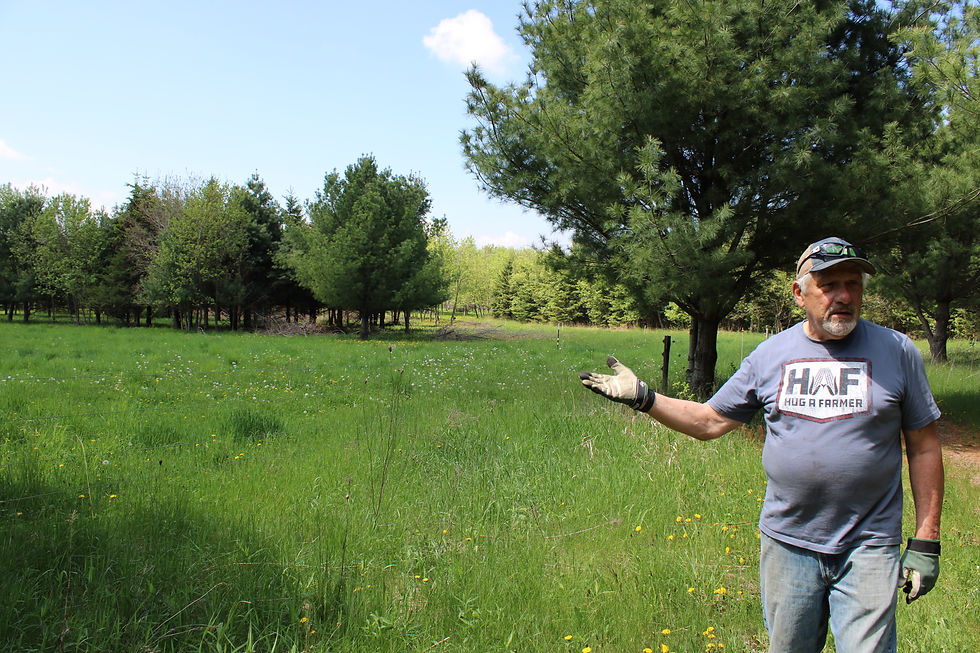Property Partnership: How Two WFU Landowners in Green Lake Support Each Other
- WFU Blog

- Jul 30, 2025
- 3 min read
By Hannah Alden, regional membership coordinator

If you happen down this farm’s gravel driveway in Green Lake, which sits atop a hill, you will find a farm store overlooking a lush green pasture. Dotting the landscape below is a herd of cattle, grazing happily in one area or another of the field. Back up on the hill, there are signs marking off pollinator habitat areas – the buzz of insects foraging here is audible.
Stepping into the farm store, there’s an array of fridges and freezer spaces, stocked with vegetables, eggs and beef. If you get to wander the property further, you’d see several high tunnels containing things like cucumbers, tomatoes and herbs and a large outdoor field with a vast selection of vegetable crops. You also wouldn’t be able to miss the multiple bird structures, built for species like purple martins, solar panels soaking in rays for energy and a large shelter allowing chickens to roam but be protected from predators.
This is Boerson Farm, owned by Danielle and Mat Boerson. After farming on another property in Green Lake County for over a decade, the Boersons came to their farm to begin site preparations in 2018.
“We did not study farming, but found our way onto this path, so we just keep learning,” Danielle said.
Over the years, the Boersons have sold vegetables, eggs and meat in a variety of ways – through a formal community-supported agriculture (CSA) model, at farmers markets and to wholesale buyers. At the current moment, they are attempting to transition their CSA to an online ordering system, which would retain elements of CSA that customers appreciate but offer more flexibility to the farmers as sometimes crops don’t mature all at the same time to fill a certain number of shares per week. Their products also get sold at the Oshkosh Farmers Market as well as at their on-site farmstand.
While they first started with developing the vegetable side of their operation, they’ve also spent a number of years grazing beef. They worked with Scottish Highlands for a while, but their current herd is now primarily Red Devon, which is a smaller-framed, hardy cow. That’s important for the Boerson Farm, as their cattle do not go into a barn in the winter or during rough weather. Instead, they seek shelter under nearby forested areas, including spots within a neighboring property owned by Ken and Kimberly Bates.
“It’s a nice partnership with Ken to have places for [the cows] to go and provide some landscape work over there,” Mat said.
The Boersons have known Ken for years. He used to be the superintendent at their children’s school. After he retired, he started volunteering at the family’s former farm site to help with their vegetable operation. The most recent connection came when Ken jumped at the opportunity to buy the acreage next door.

Ken, whose grandparents were dairy farmers near Cashton, has multiple intentions for the over 20-acre parcel that abuts the Boerson Farm. One of the main reasons for the purchase was to provide a buffer between the Boerson’s organic land and a neighbor’s conventional crops. Additionally, his overall goal is to restore the land to a native oak savannah using grazing as a helpful technique to do so. The Boerson’s cattle’s hooves create divots in the land for water and seeds to utilize.
“My wife and I support [the Boersons] wholeheartedly,” Ken said. “Life is connections. We’re stronger when we’re together.”
With his self-described “Aldo Leopold mindset,” Ken has planted over 300 trees on his property so far and also works hard to keep invasive plants at bay. He’s currently working with American Farmland Trust to create a conservation easement for his property so that it cannot be conventionally cropped in the future.
The WFU membership team visited the Boerson and Bates families during their membership tour in May. Stay tuned for additional member features highlighting farms along the tour!






Comments